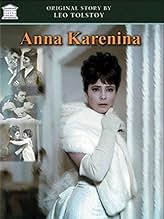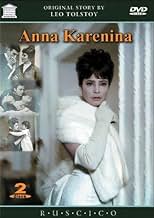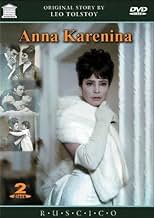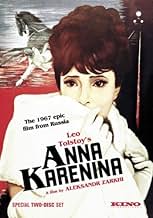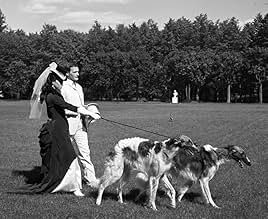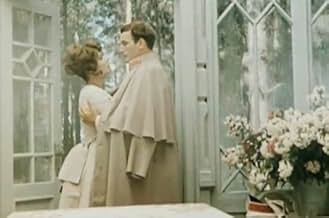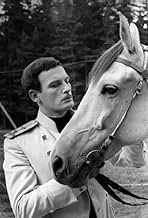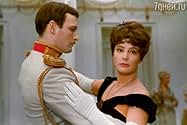CALIFICACIÓN DE IMDb
7.0/10
1.1 k
TU CALIFICACIÓN
Agrega una trama en tu idiomaAnna Karenina is a young wife of an older husband. She has an affair with the handsome Count Vronsky. By following her desires Anna complicates her life.Anna Karenina is a young wife of an older husband. She has an affair with the handsome Count Vronsky. By following her desires Anna complicates her life.Anna Karenina is a young wife of an older husband. She has an affair with the handsome Count Vronsky. By following her desires Anna complicates her life.
- Dirección
- Guionistas
- Elenco
Yuriy Yakovlev
- Stiva Oblonsky
- (as Yu. Yakovlev)
Boris Goldayev
- Konstantin Levin
- (as B. Goldayev)
Anastasiya Vertinskaya
- Kitty
- (as A. Vertinskaya)
Iya Savvina
- Dolly
- (as I. Savvina)
Maya Plisetskaya
- Knyagina Betsy
- (as M. Plisetskaya)
Lidiya Sukharevskaya
- Lidiya Ivanovna
- (as L. Sukharevskaya)
Elena Tyapkina
- Knyagina Myagkaya
- (as Ye. Tyapkina)
Sofiya Pilyavskaya
- Grafina Vronskaya
- (as S. Pilyavskaya)
Andrey Tutyshkin
- Lawyer
- (as A. Tutishkin)
Vasili Sakhnovsky
- Seryozha
- (as Vasya Sakhnovsky)
Anatoliy Kubatskiy
- Camerdiner Kapitonich
- (as A. Kubatsky)
- Dirección
- Guionistas
- Todo el elenco y el equipo
- Producción, taquilla y más en IMDbPro
Opiniones destacadas
for a part of its public, the best adaptation of the novel of Tolstoy. for me, one of good adaptation for the performance of Nikolai Gritsenko, who does a memorable Karenin and for Maya Plisetskaya. for few admirable scenes. for music. Tatyana Samoilova does a decent job. but she seems be prisoner of Veronika. and that fact becomes obvious scene by scene. she gives fragments from the image of Karenina. but the identification with the character seems be more than difficult. something missing. something impose to entire film to be out of psychology of her character. only her silhouette. sure, it is a beautiful film. but it is not the film of Samoilova. because she took , in real sense , the role in few scenes - first meeting with Vronsky, the dance with him, the dialogues with Karenin, the last meeting with Serioja. same situation for the too far by his character for Vasili Lanovoy. short, a beautiful adaptation. but its beauty is the only great virtue.
This movie was done well. The filming was beautiful and Tolstoy's novel (in so far as it is possible) was presented in a good light. The only spot that marred an otherwise-good film was the performance of the leading actress, Samoilova, playing Anna Karenina herself. So inept, clumsy,, irritatingly false and unconvincing was her performance that my single greatest sentiment throughout the film was: "Come on! Throw yourself on the train-tracks and get it over with!" Sadly, for over two hours my prayers went unanswered. A positive note, however, was struck by the stunning performance of the former legendary ballerina, Maya Plisetskaya in her role as the social lioness, Princess Betsy Tverskaya. Vasilij Lanovoj (memorable as Shervinsky, in 'Dni Turbinykh) was also a pleasure to watch as he made the most out of the relatively small role of Vronsky. In short: This would be a higher-than-average film, but for the tragically poor performance of the single actress that was under particular obligation to play well.
This film re-creates the historical setting of the 1860s brilliantly, then spoils it all with an Eisensteinian-expressionistic style of acting and photography that gives one the giggles with its melodramatic jerkiness. Worst of all is Rodion Shchedrin's shrill, strident score. It would be too loud and insistent for an axe murder in an insane asylum; in a drawing room from the reign of Alexander II it sounds simply ludicrous and irritating.
Vasili Lanovoy is handsome and romantic-looking as Count Aleksey Vronsky—his stiff bearing probably correct stylistically, his costumes wonderful. He does love to stare and lurch in that "I-am-Ivan-the-Terrible's-kid-brother" manner of Soviet film. His hair piece is not very good, either.
Lanovoy does at least very much look his part, which is more than can be said of the woman playing Anna Karenina. She looks a lot more like Anna Magnani, complete with black moustache. Mme Karenin is supposed to be an extraordinary aristocratic beauty, a being from the highest society. Here she looks like she has strayed from a film by Pietro Germi. The actress likes bombastic reactions right out of Mexican television drama, which the camera captures with Shchedrinesque careenings.
That great acting was possible, even in this school of film, is witnessed to by the master player of the role of Aleksey Karenin, Nikolai Gritsenko (1912–1979). He is quite unforgettable and detailed; he helps one understand Tolstoy better.
Most of the film is the other way around: one would hardly understand anything if one had not previously read the novel. The abrupt and disconcerting editing doesn't help.
No film could ever hope to do justice to such a literary masterpiece, but Clarence Brown's 1935 version is incomparably more satisfactory. Too bad. This could have been wonderful.
Vasili Lanovoy is handsome and romantic-looking as Count Aleksey Vronsky—his stiff bearing probably correct stylistically, his costumes wonderful. He does love to stare and lurch in that "I-am-Ivan-the-Terrible's-kid-brother" manner of Soviet film. His hair piece is not very good, either.
Lanovoy does at least very much look his part, which is more than can be said of the woman playing Anna Karenina. She looks a lot more like Anna Magnani, complete with black moustache. Mme Karenin is supposed to be an extraordinary aristocratic beauty, a being from the highest society. Here she looks like she has strayed from a film by Pietro Germi. The actress likes bombastic reactions right out of Mexican television drama, which the camera captures with Shchedrinesque careenings.
That great acting was possible, even in this school of film, is witnessed to by the master player of the role of Aleksey Karenin, Nikolai Gritsenko (1912–1979). He is quite unforgettable and detailed; he helps one understand Tolstoy better.
Most of the film is the other way around: one would hardly understand anything if one had not previously read the novel. The abrupt and disconcerting editing doesn't help.
No film could ever hope to do justice to such a literary masterpiece, but Clarence Brown's 1935 version is incomparably more satisfactory. Too bad. This could have been wonderful.
Whoever cast Tatyana Samojlova as Anna has some explaining to do. This film would be beautiful if it weren't for the star, who completely ruins every scene she's in. She is a terrible actress and her unattractiveness is a serious problem, as we are supposed to love Anna's grace and beauty. This is why her character is so tragic: this great beauty married to an old bore - we're supposed to understand why she follows her heart and goes for Vronsky, and even sort of root for her, believing she deserves her 'grand amour.' None of this comes through as you just hate Anna and her gigantic head. The film is ruined. Nepotistic casting at its most pernicious!
10alyona-m
Alexander Zarkhy's "Anna Karenina" is the best Karenina in the world. May be it's even better then Leo Tolstoy's romance :)) I've seen a lot of films on this romance, but no one of them, IMHO, compares to this one.
Anyway, Tatyana Samoylova is great actress, and Anna's meeting with her son Serezha is one of the most touching and heartbreaking cinema episode I've ever seen.
Tatyana Evgenyevna, ya ochen' Vas lublu :))
Anyway, Tatyana Samoylova is great actress, and Anna's meeting with her son Serezha is one of the most touching and heartbreaking cinema episode I've ever seen.
Tatyana Evgenyevna, ya ochen' Vas lublu :))
¿Sabías que…?
- TriviaFinal film of Lyudmila Semyonova.
Selecciones populares
Inicia sesión para calificar y agrega a la lista de videos para obtener recomendaciones personalizadas
- How long is Anna Karenina?Con tecnología de Alexa
Detalles
- Tiempo de ejecución2 horas 25 minutos
- Relación de aspecto
- 2.20 : 1
Contribuir a esta página
Sugiere una edición o agrega el contenido que falta

Principales brechas de datos
By what name was Ana Karenina (1967) officially released in Canada in English?
Responda
